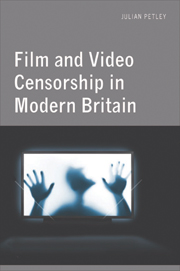Book contents
- Frontmatter
- Contents
- Acknowledgements
- Dedication
- Introduction
- Part I Censorious Rigmarole and Legalistic Overkill
- 1 A Nasty Story
- 2 Nastier Still
- 3 Two or Three Things I Know About ‘Video Nasties’
- Part II After the Deluge
- Part III Nineties Nightmares
- Part IV New Millennium, New Beginning?
- Appendix: The DPP List of ‘Video Nasties’
- Bibliography
- Index
2 - Nastier Still
from Part I - Censorious Rigmarole and Legalistic Overkill
Published online by Cambridge University Press: 05 August 2013
- Frontmatter
- Contents
- Acknowledgements
- Dedication
- Introduction
- Part I Censorious Rigmarole and Legalistic Overkill
- 1 A Nasty Story
- 2 Nastier Still
- 3 Two or Three Things I Know About ‘Video Nasties’
- Part II After the Deluge
- Part III Nineties Nightmares
- Part IV New Millennium, New Beginning?
- Appendix: The DPP List of ‘Video Nasties’
- Bibliography
- Index
Summary
One of the most disturbing things about the Video Recordings Bill, now going through the House of Lords, is the widespread ignorance of this piece of legislation's likely effects. On one level such ignorance is hardly surprising: the newspapers which so assiduously helped to fan the ‘video nasties’ affair into flame in the first place are hardly likely to turn round and criticise the offspring of that campaign – a hasty, ill conceived and thoroughly authoritarian bill which threatens to turn Britain (never renowned anyway for freedom of artistic expression) into by far the most heavily censored country in Western Europe. Public awareness has not been helped, either, by the Labour Party's acquiescence in the whole sorry affair, the result of an unholy mixture of political opportunism, cultural philistinism and evangelical Puritanism, though it should also be pointed out that owing to the hysteria whipped up by the press and the National Viewers' and Listeners' Association (NVALA) any opponent of the Bill is liable to find themselves pilloried as a supporter of the forces of evil. Most surprising, perhaps, is the ignorance of those likely to be hardest hit by the new legislation – those working in film, video and television, and this in spite of an increasingly desperate campaign against the Bill on the part of the British Videogram Association (BVA), excellent coverage of the affair in Broadcast, and an admirable lobby by the media trade union the Association of Cinematograph, Television and Allied Technicians (ACTT), which has both argued against the Bill and managed to keep important issues such as the representation of women and sexuality well foregrounded.
- Type
- Chapter
- Information
- Film and Video Censorship in Modern Britain , pp. 33 - 43Publisher: Edinburgh University PressPrint publication year: 2011

